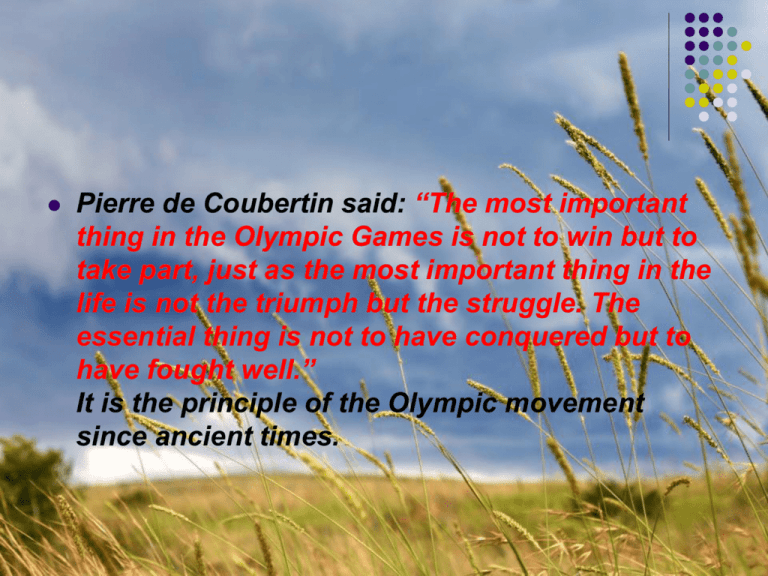Document
advertisement

Pierre de Coubertin said: “The most important thing in the Olympic Games is not to win but to take part, just as the most important thing in the life is not the triumph but the struggle. The essential thing is not to have conquered but to have fought well.” It is the principle of the Olympic movement since ancient times. The first Olympic Games at Olympia held in 776 BC in Greece. were WELCOME TO ANCIENT OLYMPIC GAMES!!! Athens: Black Figure Amphora showing a footrace • The traditional date for the first Olympic Games is 776 BC, calculated by the ancient Greeks using a list of winners, but there was almost certainly activity at the site of Olympia before that. The Greeks had only been literate since the eighth century BC, so the names of earlier winners may well have been forgotten. In historical times, control over the games was disputed between the town of Elis and the town of Pisa. This may explain the fact that there are two different foundation legends. According to one version the games commemorated a footrace held by the Idaean Herakles and his brothers with a branch cut from a grove wild olive trees at the site. However, most people believed that they were begun by the mythological hero Pelops after whom the Peloponnese (“Pelop's island”) was named. • Like most Greek heroes, he came from a dysfunctional family— his father, Tantalus, once cooked him up and served him to the gods to see if they could tell the difference between human and animal flesh (they could). His lover was god Poseidon who was associated with horses as well as the sea. Through him, Pelops had a team of the finest horses and had acquired great skill as a driver. When he grew up, he began to court Hippodameia, the daughter of Oenomaos of Pisa. The king had an incestuous passion for his daughter, according to some, and let it be known that, while anyone was free to carry her off, he would pursue and slay the hapless suitor if he could. Thirteen of them had already perished when Pelops arrived on the scene. He bribed Oenomaos' charioteer to sabotage the vehicle so that his master was thrown and killed. Pelops married Hippodameia and ruled the land quite happily for a time (although that didn't last). After his death, a shrine was built for him within the precinct and funeral games were instituted in his honour. It was the dead Pelops who received the first offerings • • The Games The games were held every four years, beginning on the second or third full moon after the summer solstice— so, sometime in late July or August. Originally, they lasted only one day and consisted of a single event, a footrace over a distance of about 100 metres known as the stadion but by 472 BC the competitions had been considerably expanded and the festival had been extended to five days. From the time of the seventh Olympiad (748 BC) onwards the prize was a kotinos, a garland of wild olive from a sacred tree which grew on the site. The branch was cut by a boy whose parents were still both living— evidently a fertility rite of some antiquity. The games continued uninterrupted for 1168 years until they were abolished, along with all of the other pagan cults, by the emperor Theodosius in 393 BC. • The presiding officials, the ones who acted as judges and enforced the rules, were known as Hellanodikai and were chosen by lot from among all the citizens of Elis. They wore purple robes and lived in a special building, the Hellanodikeon, for the ten months leading up to the games. During this period they received instruction from the nomophylakes (“guardians of the games”) on their duties and the regulations they would have to enforce. As the games approached, a Sacred Truce was declared which put an end to all hostilities and the athletes along with various dignitaries and ordinary pilgrims began to converge on the site from all over the Greek World. Anyone could compete so long as their parents were freeborn and of pure Hellenic blood and they themselves were male— no one of the female persuasion was allowed to set foot in the precinct on pain of death. • Apart from the equestrian events and the hoplitodromos, the athletes trained and competed naked, offering their bodies to the glory of Zeus. • • • According to the tradition of Hippias of Elis ca. 400 BC, the events of the Olympic Games were added to the program in the following order. Year Olympiad Event 776 BC 1st Olympiad stade race 724 BC 14th Olympiad double-stade race 720 BC 15th Olympiad long-distance race 708 BC 18th Olympiad pentathlon 708 BC 18th Olympiad wrestling 688 BC 23rd Olympiad boxing 680 BC 25th Olympiad 4-horse chariot race 648 BC 33rd Olympiad horse race 648 BC 33rd Olympiad pankration 520 BC 65th Olympiad race in armor 408 BC 93rd Olympiad 2-horse chariot race The Religious Aspects of the Ancient Olympic Games In ancient Greece, games were closely connected to the worship of the gods and heroes. Games were held as part of religious ceremonies in honor of deceased heroes, a concept displayed in the funeral games for Patroklos in Book 23 of Homer's epic poem, The Iliad. Games were also held in the context of many ancient fertility festivals. The games at Olympia were connected with both the funeral games of Oinomaos, established by Pelops, and a fertility cult involving any number of gods and goddesses who were worshipped at the site. The Olympic games began to be usurped by the prominent cult of Zeus, and eventually lost much of their religious character. The broad jumper, going for the greatest distance, sprinted down a runway, pushed off before reaching a fixed point, and then landed in a pit of soft soil The halteres or jumping weights held in the hands were not intended to make the jump more difficult, but to help the athlete balance his body so as to achieve a better result. Wrestling was known as a "heavy" event, since the training was very strenuous and there were no weight classes like those that exist today. Footraces - the Stadion The stadion, named for the length of the Greek stadium, was a 200-yard footrace. Boxing was the most At the fifth day all winners were awarded their prizesbrutal and given a banquet at a sport in ancient building known as the Prytaneion. The victor of any Olympic competition was times. The athlete honoured throughout the Greek world but nowhere so much as in his home town bound hisdemolished where he received a hero's welcome. A short stretch simply of the town wall was to show that its defence depended not so much on masonry the hands superiorin quality of wristsas and its young men. The winner was driven through the breach in a thongs four-horse chariot and leather and led the entire populace in a triumphal procession to the altar of the city god where he went the would arenasing a laid down his olive crown. A great banquet followed at whichinto a chorus with his head fully made paeon of praise composed for the occasion. Poets such as Pindar or Simonides, a good living out of writing these hymns of praise. For the rest of his life he would exposed. enjoy free meals at the civic prytaneion, reserved seats at the theatre, games and As this picture shows, festivals as well as various tax-exemptions. Often a statue of him was set up in one of were delivered the temples to honour both the athlete and the gods blows who gave him victory (Figure 2). primarily to the head. From the beginning, the games at Olympia served to The strengthen the of Greek reasing an sense of national unity. During the Hellenistic period, Greeks who came to live in foreign index finger signalled surroundings such as Syria, Asia, and Egypt, strove to hold on to their culture. One of defeat, just asathletic did the the ways they did this was to build athletic facilities and continue their traditions. They organized competitions, and sent competitors their towns to inabilityfrom to pick compete in the Panhellenic games. oneself up again--that In the 2nd century A.D., Roman citizenship was extended to everyone within the is, being knocked Roman empire. After this point there were many competitors from outside ofout! Greece, and the Olympic games became more internationalized.





